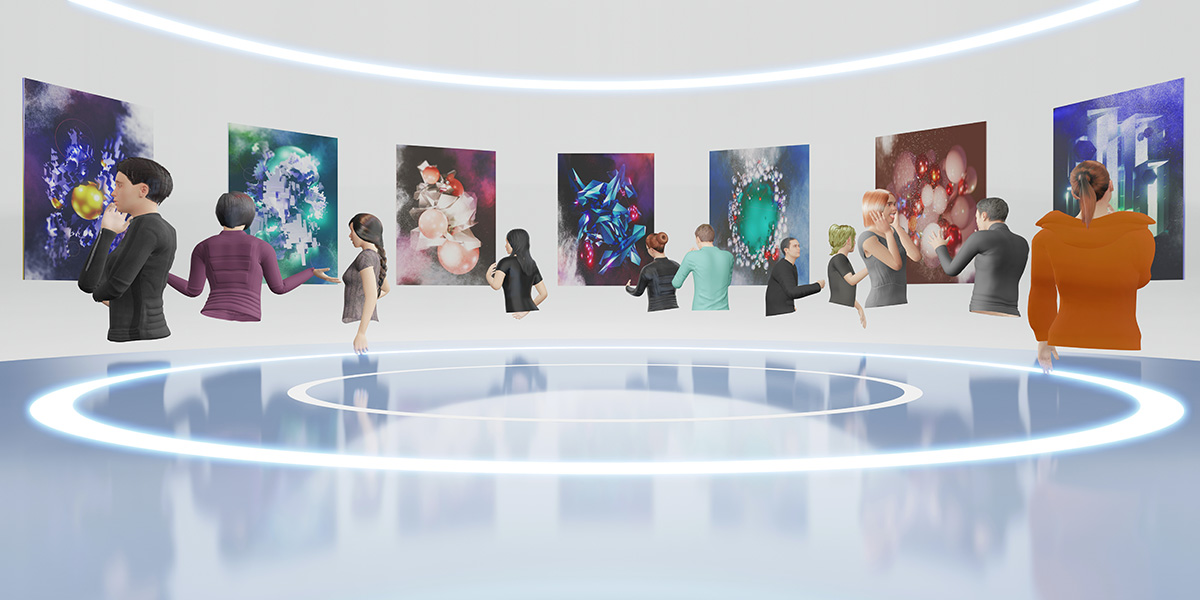Utilizing Metaverse XR in the Entertainment Industry
The Metaverse, meaning an online 3D virtual space, has the potential to significantly change economic activities, consumer behavior, and the way we work. People buying products in virtual shops and working in virtual offices—we may still be some way off such a vision becoming a reality, but the entertainment industry is forging ahead with the adoption of the Metaverse before other sectors. Let's take a look at well-known, everyday forms of entertainment in the Metaverse, and the technologies involved.
In one competition, a virtual venue replicating the real-life venue was made available online, and online participants were able to navigate around the venue as virtual avatars. What's more, the virtual venue also displayed attendees at the real-life venue as avatars, creating a sense of unity that made it feel as though the real and virtual participants were attending the event together.
Elsewhere, a major cinema operator has opened a cinema in virtual space. Users can use their avatars to freely navigate the online cinema complex, select the movie they'd like to watch, and watch it online, just like a real cinema. The service has been garnering attention, as it provides a realistic cinema experience in the comfort of your own home.

Utilizing XR for theater, concerts, and games
Virtual reality (VR) is the technology behind the Metaverse. To experience VR, users typically don some kind of head-mounted display, and move their avatar through the virtual space using a controller or other device. Technologies such as VR, augmented reality (AR) that blends virtual content with the real world, and mixed reality (MR) that combines VR and AR are collectively known as extended reality (XR). According to Japan's Ministry of Economy, Trade and Industry, the global XR market is expected to grow from $14 billion in 2017 to $208.7 billion in 2022, and is drawing a lot of excitement as the Metaverse grows as a platform.
Many ways to utilize XR are being explored in the entertainment industry. For example, XR is increasingly being incorporated into live theatrical and musical performances. Performing in studios specialized for XR—with green screens on the walls and floor, or large HD LED screens—enables video footage to be shown in the background, enhancing the sense of realism and immersiveness.
Major record companies have begun organizing concerts that incorporate VR content: the virtual elements projected on displays that serve as the backdrop are linked to the movements of the performers on the stage, and further enhanced by sound and lighting. Wearing head-mounted displays affords audiences with a 360° view of the concert venue, and they are given an immersive experience that makes it feel as if they were actually there.
Without a doubt, the area of the entertainment industry that leverages XR the most right now is gaming. The VR games market is expanding rapidly, thanks to the immersive aspect of wearing a head-mounted display and entering the game world in VR. In 2020, games that require head-mounted displays to play them became big hits, and esports competitions that specialize in VR games have started to be held.
Such VR game esports competitions feature not only head-mounted displays but also devices that can sense the player's movements, such as walking, running, and crouching, and translate these realistic movements into the movements of their character in virtual space. Efforts are also underway to combine haptics technology (tactile sensory feedback), which reproduces the sense of touch via vibrations from the controller, with VR games to provide a heightened experience and sense of realism.
XR and the related markets of VR games, head-mounted displays, the Metaverse, etc., are growing rapidly. These technologies, which are essential for the Metaverse to penetrate society as a whole, will continue to evolve and grow, opening up new possibilities for the entertainment industry in the future.


